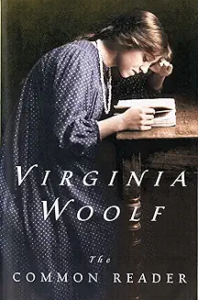The Common Reader by Virgina Woolf 1925
Though best known for her outstanding novels, Virginia Woolf wrote wonderful essays and 26 of them have been collected in this 1925 volume published a scarce three weeks before “Mrs. Dalloway” appeared. It derives its title from a line in Samuel Johnson’s “Life of Gray” about the ‘common reader’ as well as her own reference to the ‘great republic of readers’.
Woolf, as in her novels, sought to break with convention and to adapt her literary criticism and the essay into a new, modern form, one which shared something of “the immediacy, the flashing brilliance, and the unscholarliness of conversation. She believed in the momentary insight and the sudden recognition that characterized dinner-table intimacy and conversation” as noted by the British poet and literary editor, Andrew McNeillie in his Introduction to this 1983 edition.
Woolf is crystal clear in her likes and dislikes. She has nothing but scorn for H.G. Wells, Arnold Bennett, and John Goldsworthy accusing them of being stuck in old forms where the novelist focuses on traditional settings and plot elements. Instead, she values writers who are most concerned with soul or spirit, the unique element that each character brings to the world. She lauds the past masters of this approach—the Bronte sisters, George Eliot, Jane Austen, and most of all the Russian masters, Chekhov, Dostoevski, and Tolstoy who she refers to at as ‘the greatest of all novelists’. She writes of Dostoevski’s characters that they were ‘the vessel of this perplexed liquid, this cloudy, yeasty, precious stuff, the soul. The soul is not restrained by barriers. It overflows, it floods, it mingles with the souls of others.” She has special praise for James Joyce and Joseph Conrad among novelists, the essayists Walter Pater and Max Beerbohm among her contemporaries, and for Montaigne, Lamb, Hazlitt, and Joseph Addison among her forebears. Time and time again she makes the case for modernism’s rejection of the old, stilted, limited formats and pleads for an essay that should ‘simply give pleasure’ and a fiction that deals with the soul.
These essays are among the finest literary criticism I’ve read and despite 100 years passing since their publication, they feel as modern and contemporary as this week’s New Yorker or Atlantic. Woolf is a marvel, but I can never read her without feeling sad about her suicide. Today’s mental health treatments and medication might well have saved her for a longer life, but would they have blunted her brilliant writing and insights?
If you’re a fan of literary criticism and the personal essay, read this book. You’ll find it’s like sitting across from a brilliant, clever, well-read friend over a glass of wine or single malt scotch. What better outcome of reading than that!



